 |
TRICHY
Retail chain Nilgiri's sees big growth opportunities
in small towns of southern India |
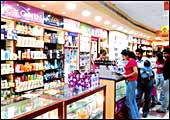 |
JALANDHAR
Cosmetic counters like this one at the Ebony
store have proved a big hit with women shoppers |
Small"
seems to be the operative word for retailers in the eight towns
visited by Business Today writers to put this story package together.
When asked to describe the retail stores in the towns, their answers
were uniform: "The Wills Lifestyle store in Belgaum is small",
or "the Ebony in Jalandhar is smaller than the one in Delhi"
or "Rajkot is dominated by small shops".
Small. And that's exactly what's keeping some
very big retailers at bay. While there is a huge retail rush into
the class one towns, it has a size and flavour of its own. On the
subject of flavour, have you heard of Moustache or Turtle Shirts
or WaghBakri, maybe Sapat? Well, you would have if you lived in
a town in West Bengal or Maharashtra. They happen to be fairly established
apparel and tea brands. And if you lived in Jalandhar you would
be visiting Yankee Tunns for your sundowner or if you lived in Rajkot
you would be indulging in a fair bit of retail therapy at 'Options'
(make that 'One Stop Shop' or 'Overtake' for Jalandhar), a retail
store that stocks all major brands across product categories. The
home market has clearly seen some early movers-all local. "Regional
brands do very well since they penetrate a particular geography
with much lesser spend than large brands, they don't have very large
overheads and they give better margins to retailers," explains
Jagdeep Kapoor of marketing consultancy, Samsika.
No wonder the likes of Lifestyle, Shoppers'
Stop and Globus are taking their time to chalk out a strategy for
the 'class one town' (population between 5 lakh and 10 lakh) market.
For one, their current formats simply don't lend themselves to a
town that small. Says Kumar S., Managing Director, Lifestyle International:
"Our format typically lends itself to towns with over 3 million
population. Our stores won't be viable in a class one town".
Sentiments that are echoed by B.S. Nagesh, MD & CEO, Shoppers'
Stop, who says that the store has no plans of entering towns smaller
than Lucknow, Kanpur, Ludhiana or Surat right now. "Shoppers'
Stop follows the same model in all its stores and doesn't adopt
different strategies for different cities," notes Nagesh. In
course of time, however, these stores may have to make an entry
into these towns, and when they do, chances are you will see a shrunk
version of the Lifestyle or Shoppers' Stop that comes up in, say,
Navsari or Trichy.
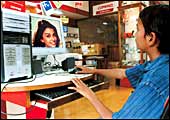 |
BELGAUM
A Compaq showroom offers the town's geeks
a chance to partake in the digital revolution |
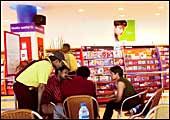 |
VIJAYAWADA
The Music World outlet keeps the city's cool
crowd up to date on the newest chart-busters |
While mega stores agonise over strategy, small
home-grown retail ventures like Chennai's Odyssey-a 'leisure store'
selling mainly books, toys and music-is quietly branching out into
Salem, Vishakapatnam and Vijayawada in addition to its existing
outlets in Trichy and Chennai. "It's important to be the first
mover. Small towns have only so much buyer capacity. The initial
size of an Odyssey store will be 2,500 square feet in a small town,
and not upwards of 6,000 square feet like in the metros, since this
is the capacity that a small town can take," says T.S. Ashwin,
MD, Odyssey.
Another successful retail chain that is largely
regional and successful has been the Nilgiri's supermarket, which
operates in the southern states. The grocery category, however,
is an interesting one where the existing metro formats are actually
being grafted on the townscape as well. Kishore Biyani-promoted
hypermarket Big Bazaar, for instance, has already gone into Nagpur,
Bhubaneshwar and Nashik with its entire offering, and has Durgapur,
Varanasi and Amritsar on the radar. "We believe that these
towns are ready for us; there has been practically no retail activity
in these towns. When we study the towns we look at where people
are going for leisure activities, like a mela or a temple, because
finally a mall is a place of entertainment," says Biyani. While
others like FoodWorld are more wary about rapid expansion, a no-frills
retailer such as the Chennai-based Subhiksha has a relatively inexpensive
model that can be taken to smaller towns.
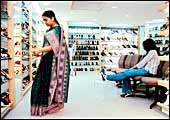 |
RAJKOT
Shoppers looking for fancy footwear in Rajkot
have the option of stopping by the local Metro store |
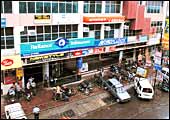 |
MORADABAD
Reliance Infocomm, Archies Gallery, ICICI
Bank and Western Union all co-exist with small shops |
It's All About Entertainment
But what about the capacity of the towns, will
he face severe competition when the next hypermarket comes in? "I
will set up the next one where there is capacity in a town before
anyone else gets there," says Biyani, with the aggression of
a first mover wanting to protect his turf. Biyani's 'entertainment
hub' model is getting popular with property developers in the towns.
Take the case of Srirang Sarda in Nashik who has developed a complex
where Mumbai-based Cineline Cinemas has opened a multiplex and Big
Bazaar is the other big anchor. Sarda has plans to start a gymnasium
and a health club as well. "We figured that the main gap in
the smaller towns was entertainment and that's the gap we sought
to fill. Moreover, I am looking at people from neighbouring towns
coming in as well, so the catchment area goes beyond just Nashik,"
says Sarda.
The model is mushrooming across the country.
Take the case of the West Bengal government agency, the Asansol-Durgapur
Development Authority, which has floated a JV with Shristi Infrastructure
Development, a private infrastructure developer, to provide need-based
infrastructure to the towns of Durgapur and Asansol. While Durgapur
will see an urban utility plaza complete with a Big Bazaar outlet,
a three-screen multiplex and an international hotel chain, Asansol
is witnessing the rise of an 'integrated township' with residential
and commercial complexes, school, hospital and of course shops.
Not very different from the townships mushrooming around metros
like Delhi and Mumbai.
 |
DEHRADUN
The town's own fashion street Rajpur Road
sports outlets of all the top foreign brands |
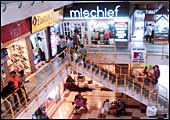 |
MANGALORE
Malls like the Saibeen, with a number of
pubs and restaurants, offer Mangaloreans an active nightlife |
Sarajit Deb, CEO of Bengal Shristi, the joint
venture company, says the strategy has gone a step further with
the model for Ranigunj, a town near Asansol and known for its coal
fields, which will soon have a spanking new infrastructure hub comprising
a truck terminal, warehouses, motels, petrol stations, shops and
dhabas. And again the 'catchment area' for these projects would
be a good part of the Burdwan district of which both Asansol and
Durgapur are part, says Deb.
Coming to the core issue of purchasing power
and capacity though, which is what large multiplexes and multinational
brands worry about finally, some multiplex operators like Fame Cinemas
of Mumbai have zeroed in on relevant pricing strategies-the operator
prices his tickets at Rs 55 at its Nashik venture. Multiplex tickets
are typically priced in the region of Rs 130 in the large metros.
"It would be stupid to imagine that Mumbai prices can work
in these places. We would obviously take some parts of the offering
and stick them in and invest only what we can recover," states
Shravan Shroff, who heads Fame Cinemas. He adds that the foray into
smaller towns is a great derisking strategy, since these towns are
fast-expanding cities but not large enough sometimes to absorb two
players.
Coffee chain Barista has followed a similar
policy. The company has launched a range of coffees at Rs 20 per
cup in Chandigarh while its prices for the metros (for a full cup
of coffee) are in the Rs-40 range. "While there is a huge aspiration
in these towns, they need something that suits the pocket as well.
We can't possibly have metro prices there," says Barista's
Head of Marketing & Strategy Brotin Banerjee.
| The grocery category is an interesting one
where the existing metro formats are actually being grafted |
Finally, while talk of entertainment hubs and
hypermarkets is headline-grabbing material, the retail topography
in these towns will in no way be limited to these glitzy newcomers.
What will, in reality, exist is a complete mix of local players,
brands, kirana stores, general stores, organised pharma outlets,
pan-biri shops, auto outlets, hardware stores and what have you.
But there is one crucial statistic that indicates
how the new kid on the block-organised retail-will fare. According
to Samsika's Kapoor, it is expected to account for 20 per cent of
the total sales of a class one town in the next five years, up from
the current 1 per cent or so.
-additional reporting by Nitya
Varadarajan in Chennai, Priyanka Sangani in Mumbai and
Sudarshana Banerjee in New Delhi
|
